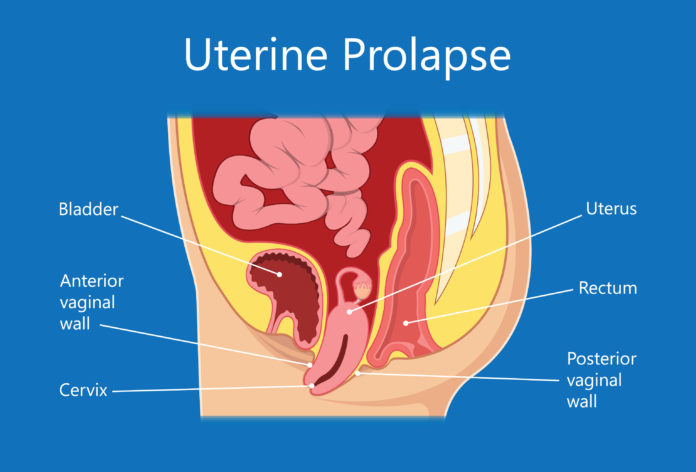Uterine prolapse happens when ligaments and pelvic floor muscles stretch and weaken no longer providing enough support for the uterus. Consequently, uterus slips down into, or protrudes out of the vagina. Let us discuss its causes, symptoms, and remedies, respectively.
What is Uterine Prolapse?
Uterine Prolapse occurs when your pelvic floor ligaments and muscles stretch to a great extent, causing weakness, and they fail to provide support to your uterus anymore. The uterus thus runs the risk of slipping out into the vagina. Women of any age can have this disease, but postmenopausal women, who have had several deliveries in their lifetime, are the most vulnerable to this disease’s exposure.
What are the Symptoms of Uterine Prolapse?
Mild uterine prolapse does not show any prominent symptoms and can often go unnoticed. However, if the becomes severe, it certainly shows symptoms like;
- You might feel a sensation of pulling or heaviness in your pelvic muscles.
- Tissues will protrude from the vagina
- You might face problems in your urinary tract, such as urine leakage or the inability to empty your bladder in one go.
- Your bowel movement will suffer.
- You might feel that something is falling out of your vagina.
- You might also feel sexual concerns because you can feel a sense of looseness in your vaginal tissues.
When should You see a Doctor?
Uterine Prolapse symptoms are not visible in the morning as much. However, as the day goes on, these symptoms become more worrisome. Therefore, if you witness any of the symptoms, you must call your doctor as soon as possible. Uterine Prolapse does not take much time to get severe. At Apollo Hospital, we offer the best advice regarding uterine prolapse.
Call 1860-500-1066 to book an appointment.
What are the Complications associated with Uterine Prolapse?
Uterine Prolapse is threatening because you can often experience the prolapse of other pelvic organs if this goes untreated for a longer time.
Anterior Prolapse or cystocele refers to the weakening condition of connective tissue between the vagina and the bladder. With severe uterine prolapse, you might encounter that cystocele is causing your bladder to bulge into your vagina.
Another complication of uterine prolapse is posterior vaginal prolapse or rectocele, and it causes weaknesses in the connective tissue separating the vagina and the rectum. Rectocele can force your rectum to bulge out into your vagina, causing difficulties in bowel movements.
Also Read About: Solitary Rectal Ulcer Syndrome
Severe uterine prolapse can displace part of your vaginal lining, leading it to protrude outside the body. Vaginal tissue that rubs against clothes can cause ulcers (vaginal sores). Although rarely, the sores can become infected.
How can you prevent Uterine Prolapse?
Performing kegel exercises regularly can be a good idea to prevent uterine prolapse. These exercises are crucial, especially after childbirth, as uterine prolapse is common in new mothers.
If you have existing constipation problems, then you must treat them. Eating high-fiber foods and plenty of liquids can help you treat your constipation problems. Fruits, whole grain cereals, beans, and vegetables would be a perfect diet plan for you for this purpose.
If you are into heavy gym workouts, then avoid weight lifting. Even if you have to lift, maintain the correct posture. Instead of your back or waist, use your legs for your lifting posture.
If you have bronchitis or chronic cough, then get treatment for that immediately. Do not smoke while you are undergoing the treatment.
If you are overweight, then also it increases your chance of developing uterine prolapse. In such a case, seek your doctor’s advice on weight loss and find out what is the ideal body weight for your age and abide by that.
How can you treat Uterine Prolapse?
It will depend upon your doctor to diagnose the severity of your uterine prolapse condition and recommend you the correct treatment.
The probable treatment options are;
1: Self-care remedies: If the uterine prolapse does not show severe symptoms, then applying some self-care remedies will cure this condition. Losing weight, treating constipation, performing kegel exercises at home will be the possible options for treating a mild uterine prolapse.
2: Vaginal Pessary: It is a rubber or plastic ring that goes inside your vagina to support the bulging tissues so that they do not protrude outside your vagina. If your doctor does recommend a pessary, remember to remove it daily for cleaning purposes.
3: Surgeries: A surgery could help repair the already weakened pelvic floor tissues. Your tissue, donor tissue, or any synthetic material would be placed on the weak pelvic floor to support the pelvic organs. Hysterectomy is another form of surgery, which is very safe for treating uterine prolapse, but you must talk to your doctor about the post-surgery complications.
Conclusion
If you are witnessing any heavy sensation in your pelvic muscles, urine leakage, or urinary retention, then go to your doctor today. Performing Kegel exercise is useful , so if your symptoms are not that severe, then you can opt for this remedy at your home to treat your uterine prolapse. For further queries regarding this health disorder, you can book an appointment at Apollo Hospital.
Frequently Asked Questions (FAQs)
Can a prolapsed uterine correct itself without any surgery?
Ans: Yes, it can correct itself, but only if the symptoms are mild. Performing kegel exercise and losing weight if you are obese can be some solutions to treat prolapsed uterine without surgery.
What should I not do if I am diagnosed with uterine prolapse?
Ans: You must not lift, pull or strain lifting heavy weights because that can worsen the condition. Try to stand on your feet for long and avoid prolonged sitting or bed rest.
When should I have a hysterectomy?
Ans: When the symptoms become severe and are beyond nonsurgical treatment, doctors recommend a hysterectomy. It helps to remove the uterus that has dropped into your vagina.


















